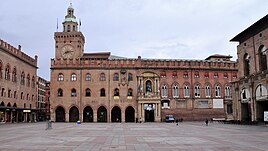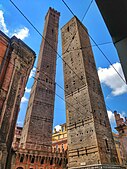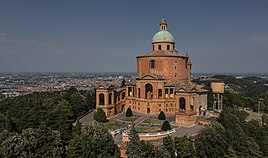Bologna
Bulåggna (Emilian) | |
|---|---|
| Comune di Bologna | |
| Coordinates: 44°29′38″N 11°20′34″E / 44.49389°N 11.34278°E | |
| Country | Italy |
| Region | Emilia-Romagna |
| Metro | Bologna (BO) |
| Government | |
| • Body | Bologna City Council |
| • Mayor | Matteo Lepore (PD) |
| Area | |
• Comune | 140.86 km2 (54.39 sq mi) |
| Elevation | 54 m (177 ft) |
| Population (31 August 2020)[2] | |
• Comune | 394,843 |
| • Density | 2,800/km2 (7,300/sq mi) |
| • Metro | 1,017,196 |
| Demonym | Bolognese |
| GDP | |
| • Metro | €39.502 billion (2015) |
| • Per capita | €38,918 (2015) |
| Area code | 0039 051 |
| Website | comune.bologna.it |
 | |
| Click on the map for a fullscreen view | |
Bologna (/bəˈloʊnjə/ bə-LOHN-yə, UK also /bəˈlɒnjə/ bə-LON-yə, Italian: [boˈloɲɲa] ; Emilian: Bulåggna [buˈlʌɲɲɐ]; Latin: Bononia) is the capital and largest city of the Emilia-Romagna region in northern Italy. It is the seventh most populous city in Italy, with about 400,000 inhabitants and 150 different nationalities.[5] Its metropolitan area is home to more than 1,000,000 people.[6] Bologna is most famous for being the home to the oldest university in continuous operation,[7][8][9][10][11] the University of Bologna, established in AD 1088.
Originally Etruscan, the city has been an important urban center for centuries, first under the Etruscans (who called it Felsina), then under the Celts as Bona, later under the Romans (Bonōnia), then again in the Middle Ages, as a free municipality and later signoria, when it was among the largest European cities by population. Famous for its towers, churches and lengthy porticoes, Bologna has a well-preserved historical centre, thanks to a careful restoration and conservation policy which began at the end of the 1970s.[12] In 2000, it was declared European capital of culture[13] and in 2006, a UNESCO "City of Music" and became part of the Creative Cities Network.[14] In 2021, UNESCO recognized the lengthy porticoes of the city as a World Heritage Site.[15][16]
Bologna is an important agricultural, industrial, financial and transport hub, where many large mechanical, electronic and food companies have their headquarters as well as one of the largest permanent trade fairs in Europe. According to recent data gathered by the European Regional Economic Growth Index (E-REGI) of 2009, Bologna is the first Italian city and the 47th European city in terms of its economic growth rate; in 2022, Il Sole 24 Ore named Bologna the best city in Italy for overall quality of life.[17] Bologna intends to become carbon neutral by 2040 and raise female employment rates, focussing on sustainable and equitable urban development.[18] The city is also increasing its investment in sustainability as part of a 2022-2024 program that integrates gender perspectives into urban planning, with an emphasis on sustainable mobility, public infrastructure, and green spaces.[19]
- ^ "ISTAT, Rapporto UrBes 2015 Bologna" (PDF). istat.it. Retrieved 11 May 2017.
- ^ "Vista par Signola Area" (in Italian). Demo.istat.it. Archived from the original on 24 July 2019. Retrieved 27 March 2020.
- ^ "Database". Archived from the original on 24 July 2019. Retrieved 27 March 2020. click General and regional statistics / Regional statistics by typology / Metropolitan regions / Demography statistics by metropolitan regions / Population on 1 January by broad age group, sex and metropolitan regions (met_pjanaggr3)
- ^ Regions and Cities > Regional Statistics > Regional Economy > Regional Gross Domestic Product (Small regions TL3), OECD.Stats. Accessed on 16 November 2018.
- ^ "Ufficio statistica regionale" (in Italian). Regione Emilia Romagna. 10 April 2019.
- ^ "Città Metropolitana di Bologna" (in Italian). tuttitalia.it. 30 November 2019. Archived from the original on 3 August 2010. Retrieved 27 March 2020.
- ^ Top Universities Archived 17 January 2009 at the Wayback Machine World University Rankings Retrieved 6 January 2010
- ^ Our History – Università di Bologna
- ^ Gaston, Paul L. (2012). The Challenge of Bologna: What United States Higher Education Has to Learn from Europe, and Why It Matters That We Learn It. Stylus Publishing, LLC. p. 18. ISBN 978-1-57922-502-5.
- ^ Hunt Janin: "The university in medieval life, 1179–1499", McFarland, 2008, ISBN 0-7864-3462-7, p. 55f.
- ^ de Ridder-Symoens, Hilde: A History of the University in Europe: Volume 1, Universities in the Middle Ages, Cambridge University Press, 1992, ISBN 0-521-36105-2, pp. 47–55
- ^ Romy Grieco (1976), Bologna: a city to discover, pp. 8–12, 138–45.
- ^ "Bologna history – Bologna culture – Bologna – attractions in Bologna – art Bologna – history guide Bologna". Travelplan.it. Retrieved 19 April 2010.
- ^ "The Italian UNESCO Creative Cities under the lead of Bologna – Bologna Città della Musica". cittadellamusica.comune.bologna.it. 26 October 2016. Archived from the original on 23 September 2020. Retrieved 3 October 2018.
- ^ Cite error: The named reference
unescowas invoked but never defined (see the help page). - ^ Dubois, Silvia Maria (28 July 2021). "I portici di Bologna sono stati nominati patrimonio dell'Unesco" (in Italian). Corriere della Sera. Retrieved 28 July 2021.
- ^ "Qualità della vita 2022: La classifica delle province italiane dove si vive meglio. Bologna la migliore nel 2022 | Il Sole 24 ORE".
- ^ Bank, European Investment (11 July 2024). Promoting gender equality in urban projects in Bologna. European Investment Bank. ISBN 978-92-861-5750-9.
- ^ Bank, European Investment (11 July 2024). Promoting gender equality in urban projects in Bologna. European Investment Bank. ISBN 978-92-861-5750-9.










